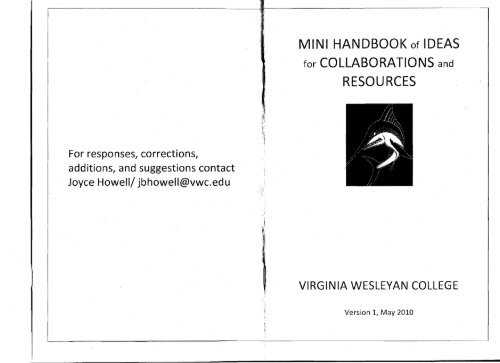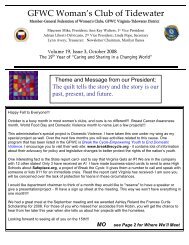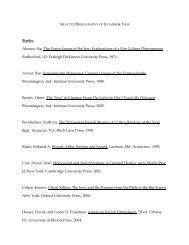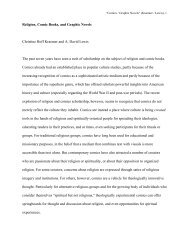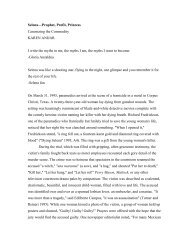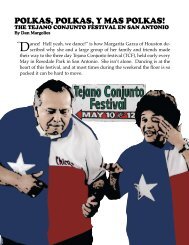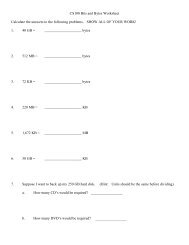Mini Handbook - VWC: Faculty/Staff Web - Virginia Wesleyan College
Mini Handbook - VWC: Faculty/Staff Web - Virginia Wesleyan College
Mini Handbook - VWC: Faculty/Staff Web - Virginia Wesleyan College
You also want an ePaper? Increase the reach of your titles
YUMPU automatically turns print PDFs into web optimized ePapers that Google loves.
For responses, corrections,<br />
additions, and suggestions contact<br />
Joyce Howell/ jbhowell@vwc.edu<br />
MINI HANDBOOK of IDEAS<br />
for COLLABORATIONS and<br />
RESOURCES<br />
VIRGINIA WESLEYAN COLLEGE<br />
Version 1, May 2010
Reaching Beyond the Classroom<br />
Community-Based and Problem Based Learning<br />
(this page under construction)<br />
Collaborating: Community-Based Learning<br />
Contact: Diane Hotaling, Director of Community<br />
Service/Batten 25/#3216/ dhotaling@vwc.edu<br />
This page will be completed following feedback from the May 20, 2010<br />
Curricular Workshop on Community-Based Learning. In the meantime, there<br />
are excellent resources for all types of practical and pedagogical matters on<br />
the Campus Compact website:<br />
Campus Compact« http://www.campuscompact.org>><br />
From the Campus Compact <strong>Faculty</strong> Resources Link<br />
you can look at examples<br />
and ideas from other schools about:<br />
• models of service-learning and other programs<br />
• syllabi from across disciplines and institutions<br />
• how to create an engaged<br />
• how to develop students as colleagues and leaders<br />
(we are in the process ofbecoming Campus Compact members)<br />
Problem-Based Learning (PLB)<br />
This is a tremendously important pedagogy for applying knowledge and<br />
know-how in case studies; it needs expansion but for now just a couple of<br />
websites will have to do. (See also Nilson's Teaching at its Best, 167f)<br />
University of Delaware had a useful site which includes Sample Problems,<br />
courses and syllabi, articles and books, etc. <br />
niversity of Buffalo's and Learning Center for also has a useful<br />
site on P-B.L:<br />
resou rcesjgEQblem based Lea rn jngh t<br />
Possibilities for collaboration: Disciplines and<br />
Student Affairs<br />
AthleticsJ
Possibilities for collaboration: Disciplines and<br />
Student Affairs (cont'd)<br />
Campus Recreation and Outdoor Activities (Jason Seward, Director<br />
of Campus Recreation!jseward@vwc.edu /#2124)<br />
• Marketing and Promotions (Graphic Design, Journalism,<br />
Communications [Public Relat.], Business)<br />
• Game Management/liability (Rec/ Leis. Studies, H & H<br />
Services)<br />
• Statistics (Mathematics, Business)<br />
• Recruitment Intramural Teams<br />
Residence life Office (McCarren Caputa, Director of Residence Life/<br />
mcaputa@vwc.edu!233-8709)<br />
• Marketing and Promotions (Graphic Design, Journalism,<br />
Communications, Business)<br />
• Data Management (weekend reports/ housing contractsl<br />
room fire safety checks)<br />
• RA <strong>Staff</strong> Training! Development Plans<br />
• Village/Floor Community Development Plans<br />
Research and Information literacy<br />
One-Credit Research Module<br />
Contact: Patty Clark, Hofheimer Library/# 3221/phdark@vwc.edu<br />
Previously, most research instruction was done in "one-sho!"<br />
sessions and was largely based on how to search. We are moving<br />
I from this approach to one which is more like a mini-course, based<br />
l not just on searching, but on defining a topic, creating a research<br />
question, and thinking about the reliability of resources. The<br />
renovation of the Library and the addition of the Foley Family<br />
Classroom make this possible. <strong>Faculty</strong> members can schedule two<br />
(or more) sessions in Foley, with the additional session(s) for<br />
students to work in the computer lab. The process for faculty is:<br />
1. Consult with a librarian about the course and assignment. Librarians<br />
can assist with planning assignments and providing wording.<br />
2. A number of sessions in Foley are planned and scheduled:<br />
• Defining a topic, Articulating a research question and search<br />
concepts; evaluating the scope of the resea rch question and<br />
feasibility for aSSignment or course; considering the most<br />
appropriate types of sources, investigating the reliability of sources<br />
• Using the <strong>VWC</strong> library catalog, as well as other libraries' catalogs<br />
and Worldcat; examining library of Congress Subject Headings;<br />
looking for notes or chapter titles in catalog records<br />
• Explainingdifferent kinds of databases. and suitability for research<br />
assignment; using databases more effectively; using Journal Finder<br />
and/or Google Scholar and Google Books if <strong>VWC</strong> does not have<br />
access to full-text; interlibrary loan<br />
• Reviewing bibliographies to find sources<br />
• Defining primary sources and how to find them<br />
,<br />
• Resources for citing sources<br />
3. Librarians provide feedback to students as research progresses,<br />
scheduling group meetings or individual appointments as appropriate.<br />
1<br />
(Coursesfor which librarians and instructors have collaboratedin this way include: Sara Sewell's<br />
JOUR 330 class, Rich Bond's HIST 360 class, Kathy Stolley's SOC 350 class, and Linda Ferguson's<br />
MBE 316 class)<br />
In addition to the Module approach, instructors can work with a librarian liaison to build<br />
information literacy into assignments. librarians are also available to provide individual<br />
research instruction to students outside of class. Working with a liaison librarian, instructors<br />
can build information literacy into their assignments.
Possibilities for Collaboration under construction for Version 2 of<br />
this handbook:<br />
Career Services Center<br />
Batten 220/Lisa Fentress /233-8713/lfentress@vwc.edu<br />
Office of International Programs<br />
Batten 22/lena Johnson / # 3116/ljohnson@vwc.edu<br />
Further reading<br />
Neil Howe and William Strauss, Millennials Rising: The Next Great<br />
Generation (2000)<br />
George Kuh et aL, Student Success in <strong>College</strong>: Creating Conditions<br />
That Matter (2005)<br />
<strong>Virginia</strong> Lee, Teaching and Learning through Inquiry: A guidebook<br />
for Institutions and Instructors (2004)<br />
Linda B. Nilson, Teaching at Its Best: A Research-Based Resource for<br />
<strong>College</strong> Instructors (2003).<br />
Library Research Module: Case Study: University of Alberta<br />
<br />
is just a beginning. Please send your bibliographic discoveries to<br />
jbhowell@vwc.edu)<br />
Factors to Consider when dealing with Millennials<br />
1. Societal Changes: More than other generations, Millennials are the<br />
"special" and "sheltered generation, who, since childhood have gotten<br />
awards and trophies for simply showing up.<br />
2. Technology-savvy: All their lives there has been the Internet, cell phones,<br />
and IPODs; they frequent Social networking sites & blogs, Email, Text,<br />
Twitter; play Video games, watch Cable/satellite TV, etc,<br />
3. "New" consumer: first generation marketed to directly beginning in<br />
childhood.<br />
4. Mental health issues: more likely than previous generations to have had<br />
counseling, a medication history, self-injury and suicidal ideation/attempt.<br />
5. Changing parents: "helicopter" or hovering parents; Millennials' parents<br />
often challenge reports of poor academic performance or conduct.<br />
6. Pressured, with lower ItThresholds of Violence", resulting in definitions of<br />
Itstress" and Itstressorslt different from previous generations. Without<br />
appropriate practiced coping techniques they often react with (seemingly)<br />
disproportionate responses.<br />
7. Achieving and conventional: responsive to explicit expectations and<br />
structure.<br />
8. Team-oriented, group affiliated.<br />
(schematic compilation drawn material from Denise Wilkinson's 2010 Tass<br />
PowerPoint and W. Scott Lewis's <strong>Web</strong>inar PowerPoint for itA Perfect Storm:<br />
Understanding and Managing Millennials," (Magna Online Seminars, Mar.<br />
16, 2010). Both draw on the work of Howe and Strauss (see bibliography).<br />
the Generations<br />
• The Silent Generation: b. 1922 to 1942 (67+ years<br />
• The Baby Boomers: b 1943 to 1960-64 (45 - 66 years old)<br />
• Generation X: b. 1961-4 to 1980-82 (29 to 46 years old)<br />
• Millennial Generation: b. 1980-82 to 2001-05 (29 and younger)


